March 2015 – Samaná, Dominican Republic
We had sailed over to the Haitises National Park in the northeast of the Dominican Republic that afternoon, leaving our slip at Puerto Bahía Marina in Samaná for the two days we planned to be away. It was a glorious sail once the wind filled in after lunch, as it tends to do there. Close hauled, we were making five knots or so, straight across the Bahía de Samaná.
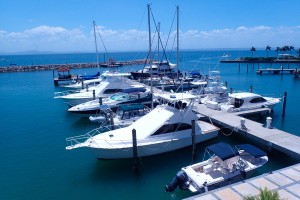
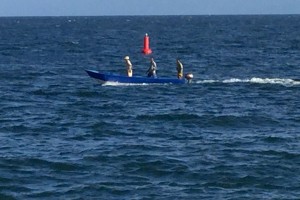 We came upon some fishermen, who were tending to their fishing nets in the water straight ahead of us. They shouted and motioned for us to steer around the nets, but we didn’t have the wind angle to play with and we were certain our shallow draft (1.5 meters) and smooth full keel would skim over the tops of the nets. They pleaded with us, I reasoned with them, they pleaded more with us, I reasoned more with them, they crossed themselves, and we all held our breath as we sailed across their nets. In the end, we skirted across without a hitch, and they waved goodbye to us, relieved, after we’d passed.
We came upon some fishermen, who were tending to their fishing nets in the water straight ahead of us. They shouted and motioned for us to steer around the nets, but we didn’t have the wind angle to play with and we were certain our shallow draft (1.5 meters) and smooth full keel would skim over the tops of the nets. They pleaded with us, I reasoned with them, they pleaded more with us, I reasoned more with them, they crossed themselves, and we all held our breath as we sailed across their nets. In the end, we skirted across without a hitch, and they waved goodbye to us, relieved, after we’d passed.
The Dominican Republic is a poor country, the fishermen of Samaná among the poorest. They row rickety skiffs for hours a day from home to the coveted fishing spots, out at dawn and back home after dark. If they’re lucky, they have a small, tattered sail to hoist that looks about as wind worthy as an old bed sheet. If they’re really lucky, they have an old beat-up outboard engine, which usually requires countless pulls to get started and stalls shortly thereafter. And yet, out to sea they go, day in and day out, to catch enough fish to feed their families. As we sailed by in our tank of a sailboat (Island Packet 380) with a Japanese diesel engine (Yanmar) that never fails, we were humbled by their fortitude and courage, and baffled by the economics of it all. How can they possibly catch enough fish to feed their families and pay for their gasoline?
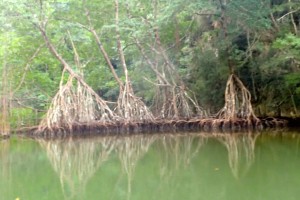
Leaving the fishermen behind in Bahía de Samaná, we pulled into Bahía de San Lorenzo an hour or two before sundown. I eagerly finished the last few pages of a suspense novel about a sailing catastrophe I’d started the night before, just as we tucked in between the karsts. We headed to wind, threw the anchor and dinghied over to an inlet with cascading mangroves and a hiking trail at the end. We hiked back to the caves, snapped some quick pictures of the petroglyphics on the cave walls and sped back to the boat just as the sun was setting.
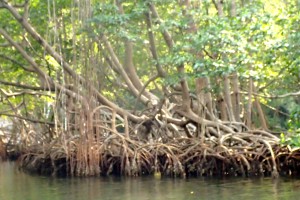
We hadn’t seen a soul since the fishermen in Bahía de Samaná, though there was a ranger station down the shore where we believed a ranger lived or worked. We relished finally being alone at anchor; the solitude of the uninhabited islands and empty anchorages was one of the things we most loved about the Bahamas we’d just left behind, and, after a week at a marina in the Dominican Republic, we were blissed to be back on the hook all alone. We toasted our sundowners – Brugal Extra Viejo with tonic – and had a drink or two more over dinner.
There are no streetlights in an uninhabited bay, and there is no atmospheric glow from skyscrapers at a seaside national park. There is a black sky full of stars, if the sky is clear of clouds. It wasn’t. There is a moon crossing the horizon, showering land and water with its chalky light, if it’s more than half full. It wasn’t. It was dark, our anchor light at the top of the mast the only light for miles. It’s hard to stay awake much past sundown in such a dark landscape, so, once we were done with dinner, we were headed to bed.
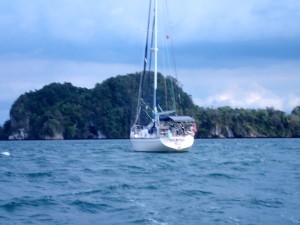
The sound of drums pierced the silent night. It sounded like three or four wooden bongos being beaten on the shore behind the karsts. For a brief second, I thought it must be an event organized by the ecotourism resort a few miles further into the bay – some sort of “commune with the natives” evening that I imagine people who visit ecotourism resorts in developing countries would rave about to their friends back in the suburbs. “We wore grass skirts and face paint, and danced in a circle around a fire while men in loin clothes played the drums!”
But the drums dropped off quickly, and there were no other signs of ecotourists – no squeals of delight, no flashbulbs snapping selfies with the drum-beating natives. There was only silence – the silence we’d finally gotten accustomed to after a month in the Bahamas – a silence we never could have fathomed from our high rise in Manhattan just months before. Drums followed by that silence was not something we were prepared for.
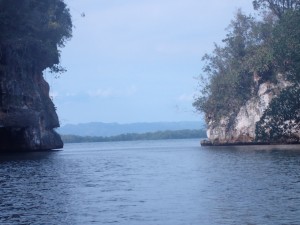
Two small outboard engines started up from the direction of the drums. Had the ecotourists taken a vow of silence and were now headed back to the resort? The outboards shifted into gear. They appeared to be zigzagging across the inlet, headed toward us slowly. Every minute or so, they would shift into neutral, and you could hear hurried, hushed voices – two or three men from the sounds of it.
I clutched for Jason. “What’s our plan?!” Jason looked completely befuddled.
“What’s our plan if these men try to board us?! They probably have machetes!!” I tried again.
Jason laughed and said, “I’m going to lock myself down in the cabin and you’re going to talk to them.”
“That’s not a plan!!” I screamed.
“I don’t speak Spanish and I’m guessing they don’t speak English. They’ll take it easy on you – you’re a blonde gringa with an Argentinian accent,” Jason reasoned. Yes, he’s just that infuriating sometimes.
I sat as still as I could, trying to decipher their heading, distance and speed from the sound of their engines, straining my eyes to make out some sort of outline in the thick darkness, training my ears to make out the words they were murmuring. All that I could determine was that they were still coming closer. Images of being slashed up by a machete and sacrificed to the gods of the sea, or being hacked up and used for fishing bate, flashed before my eyes. The suspense novel I’d just finished was about a young woman kidnapped from her sailboat to harvest her heart for transplant. Were organ sales legal in the DR?
“We need a plan!!” I hissed.
“I’ll bring you one of your golf clubs we’ve been carrying around for months – I’ll bet it would be the only time this entire trip you ever use it,” Jason joked.
I hushed him, hoping the approaching men wouldn’t hear him. The anchor light (which I usually love because its LED bulbs shine more brightly than any other boat in the anchorage) very clearly announced our presence. I implored the men not to look up, to pass by us without noticing. “Por favor, por favor, por favor….” I pleaded under my breath.
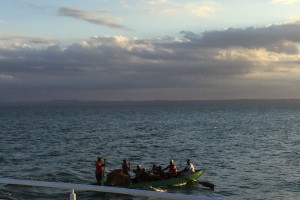
They did pass by us, far enough away that we never caught a glimpse. When they were sufficiently far, I crossed myself and shuffled off to bed. We had heard them hauling something over the sides – fishing nets we presume. Fishing is prohibited in the national park; the fishermen probably collect their nets under the shroud of darkness to avoid detection.
What’s our plan the next time we’re alone at anchor and hear a boat coming at us? Never again read a suspense novel about sailing. And lock myself in the cabin before Jason does.


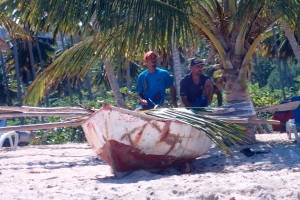
OMG that sounds so scary! I’m glad you are safe. We’ve had a few scares like that (once sailing from Panama to Galapagos and once camping in New Zealand believe it or not) I think you’ve got a good plan for future scares.
DR is very poor, corrupt and dangerous in certain places. I like the golf club plan. Consider sharpening a 3-iron to do considerable damage. It always was the best iron to wreck my score.
Poor and corrupt, sure. Warm and hospitable people, you bet! I’m looking forward to our return and an extended stay.